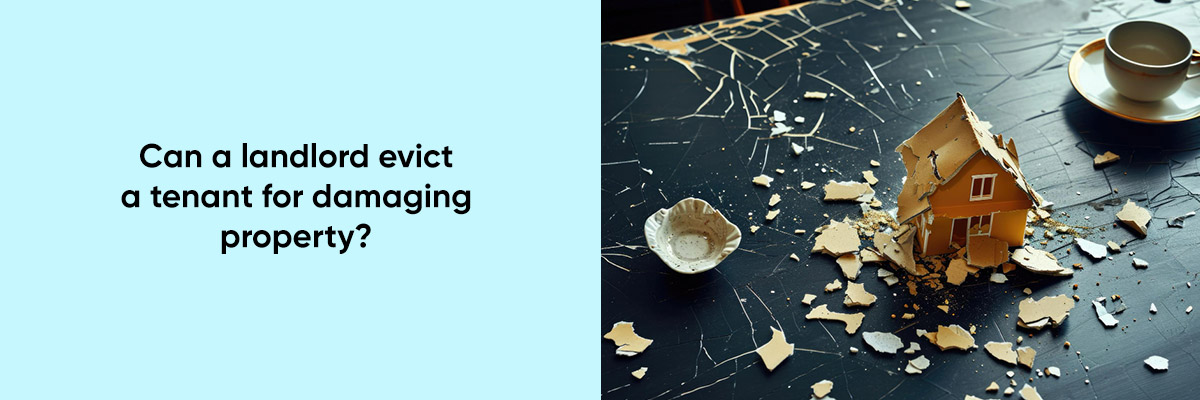In the intricate dance between landlords and tenants, the exchange of property for rent stands as a cornerstone of the rental agreement. This symbiotic relationship ensures that both parties benefit: the tenant secures a place to reside, while the landlord receives compensation for the use of their property. However, this harmonious arrangement is governed by a set of conditions outlined in the rental agreement. Among these conditions are stipulations regarding property damage, which can have significant implications for the tenant’s right to remain in the rental property.



Understanding the Rental Agreement:
Before delving into the question of eviction for property damage, it’s essential to grasp the framework established by the rental agreement. This legally binding document delineates the rights and responsibilities of both parties, covering aspects such as renovations, rent increments, lease duration, and advance payments. Importantly, the agreement may also address the issue of property damage, specifying the consequences for breaching these terms.
Determining Grounds for Eviction:
Not all instances of property damage warrant eviction. Minor mishaps, such as accidental breakages or scratches, may not meet the threshold for eviction. In cases where the damage is inconsequential and does not impede the property’s functionality, landlords often opt to address the issue without resorting to eviction measures. For instance, a tenant who inadvertently breaks a door handle may not face eviction if they promptly rectify the damage or reimburse the landlord for repairs.
Severity of Rental Property Damage:
The severity of property damage plays a pivotal role in determining whether eviction is warranted. While minor blemishes may be overlooked, significant structural damage or repeated instances of vandalism can prompt eviction proceedings. Landlords have the right to expect their property to be maintained in a reasonable condition, and egregious damage may constitute a breach of the rental agreement.
Responsibility for Property Damage Repairs:
In cases where the tenant is responsible for damages, either explicitly stated in the rental agreement or established through policy, the landlord may pursue eviction if the tenant fails to address or reimburse for the repairs. Additionally, if the damages extend to other tenants’ properties or pose a safety hazard, the landlord is within their rights to demand the tenant vacate the premises.
Pattern of Misconduct:
Repeated instances of property damage or a pattern of misconduct can also justify eviction. If a tenant habitually disregards the property’s upkeep or attempts to evade eviction by offering monetary compensation, landlords may have grounds to terminate the tenancy. Such behavior reflects a lack of respect for the rental agreement and compromises the landlord’s trust in the tenant’s ability to maintain the property.
Laws and regulations at the federal and state levels regarding evicting tenants for property damage:
Both landlords and tenants have specific rights and responsibilities governed by federal and state laws and regulations. When property damage occurs, landlords may have the legal right to evict tenants, but there are also limitations to this right. It’s essential to be aware of these laws to understand your rights and obligations.
For instance, in some states, landlords can only evict tenants for property damage if it’s significant and not caused by normal wear and tear. Additionally, landlords must follow specific procedures and provide notice to tenants before initiating the eviction process.
Understanding these laws can help protect both landlords and tenants and ensure fair treatment in property-related disputes.
Facing Eviction for Accidental Property Damage? Here’s How to Recover
Accidents happen, and sometimes those accidents can lead to damage in your rental property. While major damage can be stressful, it doesn’t have to mean eviction. Here’s how to approach the situation and increase your chances of staying in your home:
1) Prompt Communication is Key:
- Don’t wait for your landlord’s inspection to discover the damage. The sooner you inform them, the better.
- Be honest and upfront about what happened. Explain the situation in detail and apologize for the inconvenience.
2) Take Responsibility and Offer Solutions:
- Show your willingness to make things right.
- If possible, offer to pay for repairs upfront or suggest reputable contractors who can fix the damage quickly and efficiently.
- If replacing the broken item is an option, act promptly to find an identical replacement.
3) Emphasize Your Reliability:
- If this is your first offense, highlight your history as a responsible tenant who pays rent on time and maintains the property well.
- Express your sincere regret and assure your landlord it won’t happen again.
4) Maintain a Positive Demeanor:
- Be polite and respectful throughout the conversation.
- Avoid getting defensive or making excuses.
- A positive attitude goes a long way in demonstrating your commitment to resolving the issue.
5) Building Positive Relationships:
- Having a good rapport with your landlord can be beneficial in such situations.
- If you’ve consistently maintained good communication and taken care of the property, they might be more understanding.
Conclusion
Navigating the complexities of landlord-tenant relationships requires a clear understanding of rights, responsibilities, and recourse. While landlords have the authority to evict tenants for property damage under certain circumstances, eviction should be viewed as a last resort. Effective communication, adherence to the terms of the rental agreement, and fair resolution of disputes can foster a harmonious living environment for both landlords and tenants. Ultimately, by upholding the principles of mutual respect and accountability, landlords and tenants can cultivate a positive rental experience that benefits all parties involved.


